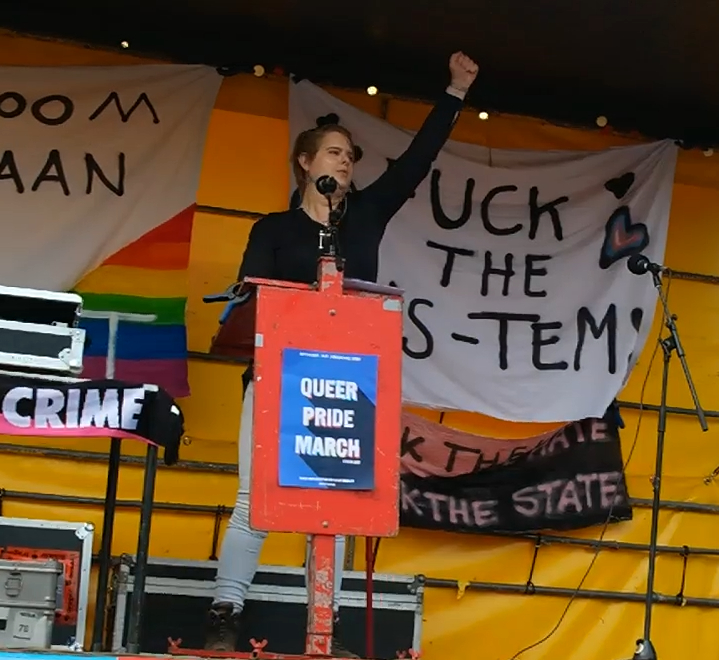Mila at the Queer Pride March: “Queer culture must be inclusive” (video)

Yesterday some 500 people joined the strong and lively Queer Pride March in Leiden. The protest began with three speeches. Here’s the one by Mila, who demanded that all queer spaces and queer culture must be made inclusive.
I’m here. I’m queer. I’m disabled.
I’m here as a disabled transgender lesbian. This should not be extraordinary. After all, queer people are far more likely to have a disability than cisgender straight people.
And yet, we disabled queer people are rarely seen, or heard, or are present in queer spaces. I want to be clear: this is not an accident.
I want to tell you about the Gay Games in Amsterdam, which were held in 1998. I will call these Games the Queer Games, because in sign language, the sign for gay is used for gay men, and therefore the deaf community called these Games the Queer Games.
The theme of the Queer Games Amsterdam was “Friendship through Culture and Sports”. The organizers put together a group of disabled people and allies, who spent two years preparing for the Queer Games, making them inclusive from the beginning. And it worked.
The Queer Games were wheelchair accessible. The Queer Games had rest spaces for people to rest. People with HIV and AIDS were included. Four sign languages were used during the Games. Signdancers translated multiple music shows for deaf people. Disabled people participated in sports such as karate. The Queer Games were the first public event where same-gender wheelchair dancers participated.
By all accounts, the Queer Games were a success for queer people, for disabled people, and especially for queer disabled people.
And yet, it did not last. The wheelchair ramps were put away. The rest spaces disappeared. The interpreters were not booked for upcoming events. The culture of accessibility itself disappeared.
Disabled queer people did not cease to exist; I’m proof of that. And I’m here to say we disabled queer people deserve accessibility.
We demand accessibility, because we are part of the queer community, and the community must include us.
Inclusion does not come by chance; it must be considered beforehand, it must be implemented in consultation with disabled queer people; there must be a culture of accessibility for all.
Pride started as a protest. Pride is part of queer culture. Pride empowers us as queer people.
For queer culture to empower queer disabled people, we need to incorporate a culture of accessibility and inclusion for queer disabled people in queer spaces. Queer culture must empower all of us. Queer culture must be inclusive. Queer spaces need to be accessible.
And it is on all of us, here today, to make queer spaces and queer culture inclusive for all queer people.
Mila
Alles over de Leidse Queer Pride March / Everything about the Leiden Queer Pride March
- Terugkijken naar de Leidse Queer Pride March
- Mila bij the Queer Pride March: “Queer cultuur moet inclusief zijn” (video)
- Toespraak bij de Queer Pride March: “Plots was ik homo en bruin” (video)
- Leiden Queer Coalition: “Tussen droom en daad staan gezin en staat” (video)
- Looking back at the Leiden Queer Pride March
- Mila at the Queer Pride March: “Queer culture must be inclusive” (video)
- Speech at the Queer Pride March: “Suddenly I was gay and brown” (video)
- Leiden Queer Coalition: “Between dream and action stand the nuclear family and the state” (video)

Heck yeah. Indeed. I now remember the almost omnipresence of SL interpreters in 1998. While sad that this practice has largely been left, it is also a sign that inclusive organising works (but requires some budget, SL interpretation is work). So let’s from now on always organise inclusively! It will become a routine fast enough 🙂